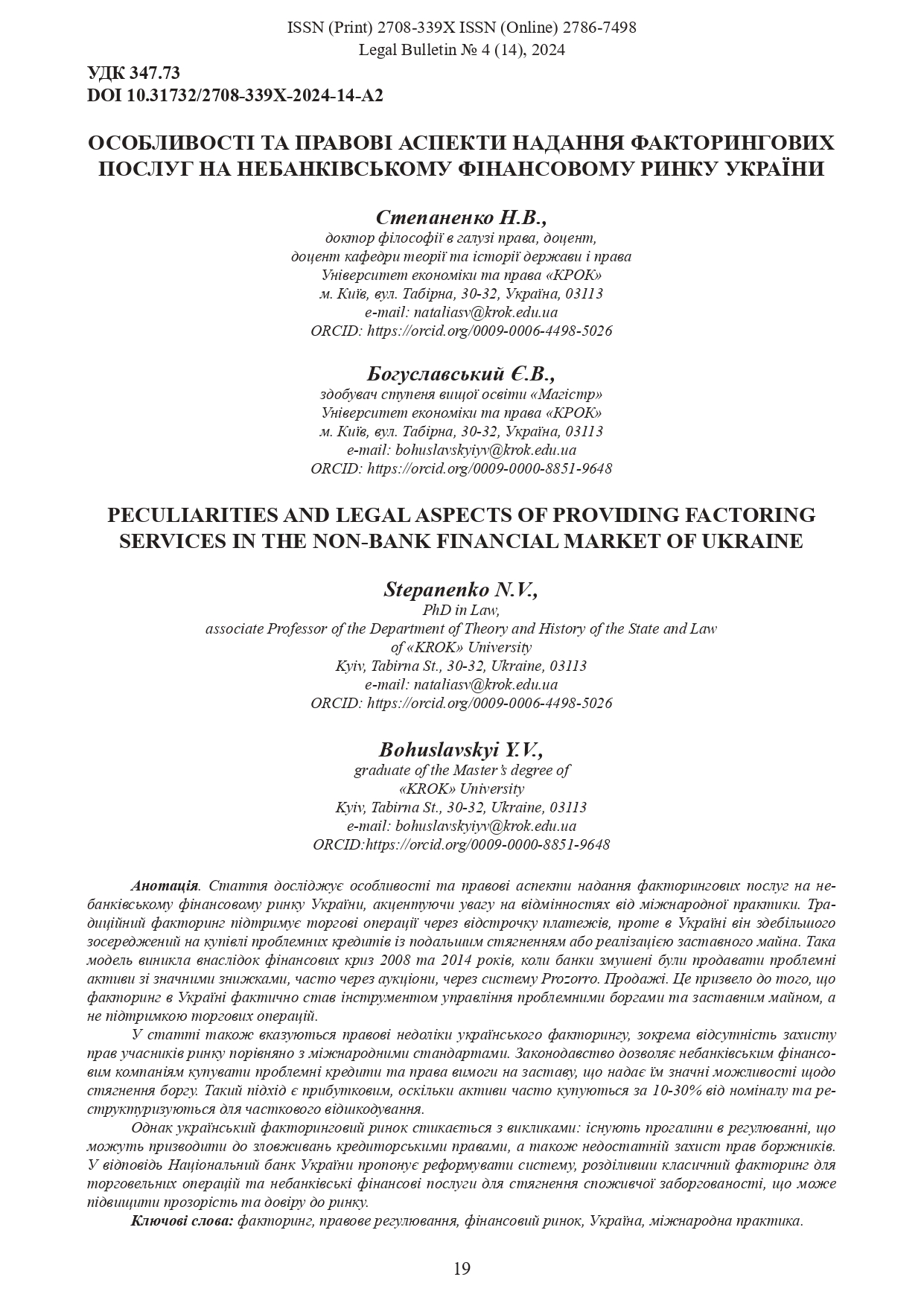PECULIARITIES AND LEGAL ASPECTS OF PROVIDING FACTORING SERVICES IN THE NON-BANK FINANCIAL MARKET OF UKRAINE
DOI:
https://doi.org/10.31732/2708-339X-2024-14-A2Keywords:
: factoring, legal regulation, financial market, Ukraine, international practiceAbstract
This article examines the unique characteristics and legal aspects of factoring services within Ukraine’s non-banking financial sector, highlighting their departure from international factoring practices. While traditional factoring supports trade transactions through deferred payments, Ukrainian factoring largely focuses on purchasing distressed debt for subsequent collection or asset sale. This model developed as a response to economic crises in 2008 and 2014, where defaults on loans caused banks to sell distressed assets at discounts, often through auction platforms like Prozorro.Sale. Consequently, factoring in Ukraine is commonly associated with debt recovery and property repossession, distinct from the trade finance role it plays internationally.
The article identifies legal and regulatory issues in Ukraine’s factoring market, including limited protections for clients and debtors, which contrast with global standards for factoring operations. Ukrainian law allows non-banking financial companies to acquire problem loans and associated collateral rights, providing these companies substantial control over debt resolution processes. This model has proven profitable, as assets are often acquired at 10-30% of their nominal value and then restructured for partial recovery at higher rates, sometimes involving court enforcement.
Amid this, the Ukrainian factoring market faces challenges such as regulatory gaps that allow for potential misuse of creditor rights and a lack of debtor protections. The National Bank of Ukraine, in response, has proposed regulatory reforms to distinguish between classic trade-based factoring and non-bank financial services for consumer debt recovery, potentially increasing transparency and investor confidence.
In conclusion, the article underscores the need for legislative updates to protect participants’ rights and align Ukraine’s factoring practices with international standards
References
Цивільний кодекс України. URL: https://zakon.rada.gov.ua/laws/show/435-15 (дата звернення: 03.11.2024).
Закон України «Про фінансові послуги та державне регулювання ринків фінансових послуг», № 2664-III. URL: https://zakon.rada.gov.ua/laws/show/2664-14 (дата звернення: 03.11.2024).
Дерев’янко С.І. Факторинг в Україні: стан та перспективи розвитку. Міжнародний мультидисциплінарний науковий журнал «КОГОΣ». 2020. № 10. С. 34-40.
Момот Л. Факторингові послуги в Україні. Науковий вісник Херсонського державного університету. 2016. Вип. 16. Ч. 2. С. 147-149.
Момот Л. Факторинг та перспективи його розвитку в Україні. Збірник наукових праць ЧДТУ. 2014. Вип. 36. Ч. 1. Т. 1. С. 126-130
Белінська К.В. Особливості здійснення форфейтингу як різновиду факторингу в Україні. Матеріали ІV Всеукраїнської науково-практичної конференції «Трансформація фінансової системи України: тенденції та перспективи розвитку» (25-26 листопада 2020 року). С. 8-10.
Герасименко Д.Є. Перспективи розвитку факторингових компаній в Україні. Матеріали ІV Всеукраїнської науково-практичної конференції «Трансформація фінансової системи України: тенденції та перспективи розвитку» (25-26 листопада 2020 року). С. 18-19.
Національний банк України. Концепція регулювання реформування факторингу в Україні. URL: https://bank.gov.ua/admin_uploads/article/Conception_factoring_pr_23-06-2023.pdf (дата звернення: 03.11.2024).






